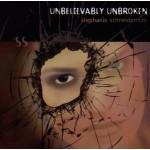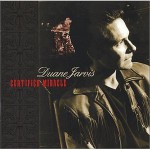 X-Angels
X-Angels
Four Bridges
Box Records
Singer/songwriter Tom McGriff and his posse of sidemen, X-Angels, return for the fourth installment in their ongoing chronicle of adult life within this crazy, mixed-up world in which we live. It’s the second album under the “X-Angels” moniker (the band formerly having been known as the Cowboy Angels: who produced two earlier albums in the mid ‘90s).
McGriff never quite fit the whole cowboy thing in the first place, his music always seemed to share more in-common with Dylan and John Hiatt, or Elvis Costello and Graham Parker. Strangely, however, the band seems much more comfortable now with the occasional chaw of classic Country chew.
Here, abetted by his longtime sidemen, peripatetic bassist Rich Gooch and guitarist Steve James (who goes by the name Steve James Wright, here), and relative newcomer drummer Rinehardt Melz, the band navigates a set of thirteen distinctive songs. McGriff wrote seven of them and co-wrote another, “Cold Dark Road,” with Steve Bradley. Wright co-wrote four and the other is a fine cover of Mark Spangler’s “Natalie.”
And, moreso than ever before, the band seems superbly well integrated; thus assuring that the music seems far less derivative, with far more impact than in previous incarnations. Part of the credit for this must go to Melz, who displays a much feistier disposition than his predecessors upon the throne. And Griffin deserves special mention for developing a voice of his own, decidedly less reliant on the vocal affectations of others.
Still, when McGriff does Dylan, he really does Dylan. Such as with the traditional-folk flavored “This Far.” With a melody derived somewhat from Paul Simon’s “Scarborough Fair,” (which itself was derived from something else as well), McGriff captures every nuance of a Dylan vocal performance, sounding more like Dylan than even Dylan himself. Simply remarkable.
However, the chief reason the band sounds more original and congealed lies in the hands of Steve James Wright. Adding a tastefully selected array of guitar sounds, styles, and techniques, as well as contributing mandolin phrasings to several songs, Wright displays a rare gift for finding just the right combination of sonic textures for each song; while referring to a wide musical vocabulary for his lead guitar expositions. His is the final coat of paint, the wax detail, upon this shiny vintage pickup truck of a band.
The opening track, “Just Turn Around/Walk Away,” is one of the best. Leading in with Wright’s rousing guitar settings and a jangling mandolin part. Melz’ syncopated kick/snare interplay create tension though the verses, exploding in the choruses, where Duffy Bishop lends a high harmony backup vocal. Wright interjects a satisfying slide guitar solo in the middle break.
The band’s take on Spangler’s “Natalie” is very strong. Melz’ solid drumming opens the tune, melting into Wright’s twisting guitar solo. McGriff’s raspy voice fits the plaintive mood of the song— a song which is right up there with Tommy Tutone’s “Jenny (867-5309)” as one of the best in the “Chorus With Spelling or A Numerical Sequence” category. “Bridges” is a tender Country waltz, that again benefits from Wright’s mandolin in the instrumental break, as well as from guest Glen Holstrum’s well placed organ pads.
McGriff’s collaboration with Steve Bradley, “Cold Dark Road,” refers directly to an earlier Bradley classic “Long, Long Truck,” while expertly copping the Country truckin’ style popularized in the ‘60s by Dave Dudley. Appropriately enough, Wright’s “Moonlight Express” is a train song— which succeeds upon his haunting melody and earnest vocal delivery, as well as with some sterling guitar-work; Holstrum’s Hammond organ softly sobbing in the background.
The simple and sincere declaration, “An Explanation” is a concise piece of writing: the outline of an actual explanation for a wrong committed in the distant past. The arrangement is basic acoustic guitar, bass and drums in the Dylan tradition. Still, the universality in McGriff’s heartfelt words ring instantly true. “I can’t pretend you’d demand consolation/Or presume to claim an impact on your life/But through reflection or regret, I know I’ll never forget/Just how much you meant to mine.”
McGriff’s train song, “Love Tracks,” could easily pass for a John Hiatt tune, with Wright’s roiling slide guitar sounding a lot like the phrasing of Bonnie Raitt crossed with technique of Lowell George. Tasty. Duffy Bishop’s high harmonies are a plus as well. Wright’s “Two Eyes” sounds like the Eagles’ Glenn Frey in the Desperado period, singing an early Tom Petty song. Melz’ clackety clip-clops seem a bit over the top in attempting to convey galloping horses. But otherwise, this is a true modern Cowboy song with “Coyotes callin’, jet planes fallin’,” and some fine guitar work throughout the song.
“When Your Love Runs Dry,” McGriff’s good-natured send up of the Buddy Holly/Everly Brothers era, is expertly delineated, with appropriate handclaps and Wright’s chortling lead guitar phrases sounding something like the work of Johnny Cougar Mellancamp. Wright’s “Infrared” is a rollicking piece of jangling rock, with a Beatlesesque chorus augmented by a mandolin that sounds like a plucked banjo. A good song. And McGriff’s desolate folk song “This Far” is certainly equal to anything academy award winner Bob Dylan has released in the last 30 years. Glenn Holstrum nicely echoes Al Kooper, with timely Hammond organ fills, as McGriff’s chiming acoustic guitar rhythm sweeps along beneath.
The final track, “Gone To Memphis,” is a pointed song that bemoans the real loss of a lot of talented local musicians (Craig Carothers, Caryl Mack and several others come to mind) to the Memphis pipeline. “Yeah we had quite the nightclub scene/There was a band down here on every block/You could feed your soul for any kind of mood with the blues, jazz folk, country or rock….. So if you come down here sometime next year/And they ask whatever happened to me/Just say I left for Memphis/Tell them I moved to Tennessee” That is an extremely accurate portrayal of the Portland scene in the ‘80s, and what it looks like today.
This is a well-crafted album by a band that knows precisely what it is doing. There are few missteps here. X-Angels present high-quality, Western-flavored material with panache and flair. Their music would seem better suited for Austin or Memphis, or any town that displayed much interest in live music. Portland has become a “festival town.” We love our music festivals and community food fights, but we don’t really support music or the musicians who make it on a daily basis. It’s a cycle that the local music scene has endured before that will doubtless recur again in the future. But currently, that cycle is at its nadir.
 Stephanie Schneiderman
Stephanie Schneiderman
Unbelievably Unbroken
Self Produced
Stephanie Schneiderman, a talented young songstress, has been on the local scene for a few years now, honing her craft as a singer and a songwriter, as well as a performer. Though she did release an acoustic album in 1999, this is her first “produced” album. And it is the production that holds together the various themes and styles explored here.
Stephanie is obviously a good listener, because, from song to song, at one point or another, her music evokes an array of current female artists: including Aimee Mann, Shawn Colvin, Stevie Nicks, Johnatha Brooke, Suzanne Vega, Emmilou Harris, Bonnie Raitt, Alanis Morissette, Sheryl Crow and Rickie Lee Jones, among many others.
But Schneiderman is no singing puppet. Her songs reflect an individual experience and point of view. That she has not yet found a true and complete voice of her own is of little real consequence, for she is in very good company when reflecting her influences. Producer, Martin Feveyear, deserves credit for giving each song a patina and sheen, without cloying tricks.
Despite disparate and diverse arrangements, recorded at different locations, at various times, by a revolving array of musicians, the songs seem musically connected— allowing Stephanie room to create and execute her sonic aspirations. Each song is a tour de force, a compact composition unto itself— often times bearing no stylistic relationship to what precedes or follows.
The final two songs, “Marmalade” and “Some Birds Ain’t Supposed To Fly” are perfect examples. The former track sounds like an outtake from Suzanne Vega’s recent work, driven by intriguing drum and percussion loops; the latter modeled after a classic, Billie Holliday/Rickie Lee Jones Blues style. Pretty diverse. But, all the same, it works.
The first track, “New Skin Completed,” develops slowly , first featuring Tim Ellis on acoustic guitar and Stephanie vocalizing, cooing like Shawn Colvin or Stevie Nicks. Soon they are joined by John Ervie on jagged electric guitar as the drums and bass kick in. By the memorable chorus, Ellis is adding mandolin, while Stephanie contributes Beatles-like backgound vocal harmonies. At the bridge, real, pastoral strings enter the mix. Restrained, but effective, a great introduction to Stephanie’s world as we find it today.
“Anyway” follows, a cocktail samba rhythm, decorated by Don Pollock’s languorous pedal steel guitar, before drummer Charlie Doggit kicks in with a gently insistent beat. Another solid song. The eerie “Daddy’s Getting Closer” takes on the topic of child sexual abuse with a bleak, dreary lullabye. The title track is a Morissettian rampage that directly confronts the issues of sex and attraction. Stephanie’s vocals display a certain contained rage, until the snarl relegated to a sort of Shawn Mullins-ish form of talk-singing/ heavy, emotive breathing by the second verse. A strong chorus helps to drive the song, all the same.
The similarities between Schneiderman’s “Lucy” and Sheryl Crow’s “All I Really Want” are too numerous to mention, but exist to the point of distraction. A better setting for Schneiderman’s delicate voice is the lilting ballad “Remember You.” With sonorous strings murmuring like the wind in the ponderosa pines, with a coyote of Pollock’s pedal steel guitar howling at the moon, “Why Did You Run” combines Stephanie’s seamless harmony vocals with a guest appearance by Dave Andrews of Calobo performing in the duet passages.
Stephanie sounds like Sheryl Crow singing a Bonnie Raitt tune on “Betty,” a tune that lights up behind guest Jeff Trott’s fiery slide guitar work. In “Deep End,” Schneiderman investigates the danger involved in interpersonal relationships. Martin Feveyear’s well-placed Fender Rhodes keyboard figures mix nicely with Chris Murphy’s ethereal violin parts. “How Long” falls somewhere between the somber march of Sarah McLachlan and the triumphant anthem of Sinead O’Connor (or at least Sinead Lohan). Nice.
This album is bi-polar to say the least. No one will ever claim that Stephanie Schneiderman lacks versatility. Her voice is pliant enough to meld with nearly any arrangement. But, because of this, it is difficult to pin her down. She refuses to make a commitment to a specific style of music. This is a great record, full of a lot of musicality and intelligent. Once she finally finds her own true voice, it would seem that Stephanie Schneiderman will have many fine albums ahead of her.
 Duane Jarvis
Duane Jarvis
Certified Miracle
Slewfoot Records
Duane Jarvis has been gone from Portland much longer than the years he spent playing in the Portland clubs. Still, his is a true legacy of a hometown boy making good. First he landed a job playing with a latter-day version of the Divinyls. Then he developed associations with the likes of Dwight Yokum, Rosie Flores and Lucinda Williams. He lived the LA lifestyle for many years before moving to Nashville in the ‘90s. He’s had a solid career in music, which is a lot more than most local musicians can claim
What we have here are thirteen Country-tinged tunes, which reflect Rock, Blues, R&B, and even Tex-Mex influences, while maintaining a sparse simplicity in the arrangements and instrumentation. All of the songs were written or co-written by Jarvis (including two he wrote with Lucinda Williams). None of them is likely to set the world on fire, but each rings with a certain hard-won truth.
There’s a Louisiana swamp feel to the title track, reminiscent of Neil Young’s “Love Is A Rose,” with Duane’s nasal, adolescent vocal leading the way. “Forgive The Fool” sounds as if it were learned at the Doug Sahm school of Tex-Mex— Fats Kaplin providing the authentic accordion parts. “Love Sometimes” sounds like Mick Jagger and the Stones, circa the “Wild Horses” period.
An R&B flavor sneaks into the loping “Intoxicate Me,” Duane’s raspy drawl holding down center stage. “You Stopped Lovin” Me” sticks closer to a traditional Country sound. Duane’s nifty guitar solo recalls some of James Burton’s finest work. Steve Fishell’s pedal steel guitar adds a honky tonk Country element to the set. The pedal steel on “Squeeky Wheel” backs a jaunty two-step, Bo Diddley rhythm. “Still I Long For You” a Jarvis and Lucinda Williams number, is something of a Cajun blues ballad.
A somber little rocker, “Sad Blue Year” sails upon some very concise fretwork from Duane and a memorable low-string guitar figure in the tasty chorus, Duane cuts loose for a satisfying solo at the end of this number. “Broke Not Busted” falls back into a comfortably laid back Country mode. “My Brush Is Dry” is a Stonesy rave-up, fitting the “Honkey Tonk Women” era to a T.
A fine little truckin’ tune, the Jarvis/Williams composition “Pocket Of Coins” is a road song about travelin’ the world. “This pocket of coins tells me where I’ve been.” A touching and tender ballad, “The Last Time You Cried” benefits from a subtle arrangement.
This is the sound of good ol’ boys a-pickin’ and a-grinnin’ in some back room studio. There are no pretenses here. There is no irony. There is an honesty and straightforwardness that is both disarming and disconcerting at the same time. People don’t make music like this anymore, do they? Well apparently they still do in Nashville, Tennessee. And Duane Jarvis remains in laid back Nashville, making music, as he has done for the past twenty years. There’s no reason to stop now.
 Sally Tomato
Sally Tomato
Soup
Self-Produced
Many people know of Carlos Marcelin’s brilliant work as guitarist for the band Silkenseed. His brilliance is no less effulgent here. However, let it be said right now that Carlos hit a grand slam home run the day he ran into Sally Tomato. Sally Tomato. Is she the product of Artificial Intelligence? Is she a figment of some deranged scientist’s libidinously twisted mentation? Is she the 21st century uberfrau? Is she all of the above? Indeed she is, and more. Sally Tomato is all of the above and more. Much, much more.
Sally Tomato was born a million years ago on the Jovian moon Io. Her mother was Dorothy Parker. Her father: Lenny Bruce. Her brother is Wild Man Fischer. Her sister is Maggie Roche. Her uncle is Pee Wee Herman. Her aunt is Laurie Anderson. She is the only child of an only child. She created herself in the breakroom of a Goodyear tire factory in Akron, Ohio. She cannot see the color orange. She picks up the signals of high-powered Mexican radio stations in the fillings of her teeth. She once helped a chimpanzee to memorize the first three acts of Hamlet.
Sally Tomato once ate a jar of Miracle Gro, and it was a miracle! She grew. She once ate dirt and shat a brick. Sally Tomato has three hearts. Sally Tomato once made an asshole disappear. It reappeared in Bogota, Columbia, working for a provisional military junta: which was overthrown the following year. Sally Tomato hears all your thoughts. She writes them down on small pieces of rice paper and sets them afloat upon the Willamette River. Sally Tomato sleeps with one eye open.
Sally Tomato is the most original poet/singer/songwriter to hit town since Earl Benson retired. She is hip. She is raunchy. She is totally on the money. She wants to be your Nutty Buddy. That could be a problem. Sally Tomato has a way with words. She is one of a kind. They threw away the mold. Sally Tomato is a fine addition to soups and salads. Ask for Sally Tomato aspic.
Put Sally Tomato on your Christmas gift list. Ask Santa for Sally Tomato. She is not unbreakable. She is not returnable. There are no refunds or exchanges. Do not remove tag. Buy Sally Tomato. Be Sally Tomato. Sally Tomato. She is one of a kind.
And Carlos Marcelin is a truly brilliant guitarist.
